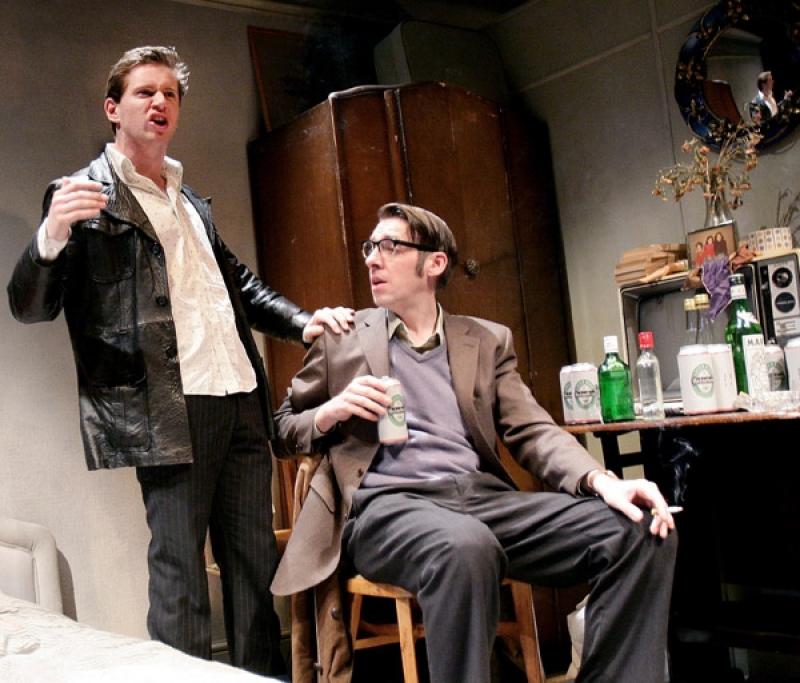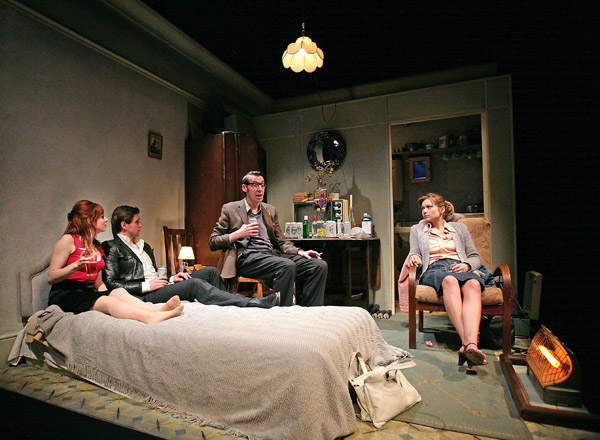Ecstasy, Hampstead Theatre | reviews, news & interviews
Ecstasy, Hampstead Theatre
Ecstasy, Hampstead Theatre
Mike Leigh’s own revival of his 1979 play is bleak but wry and truthful

Film-maker and playwright Mike Leigh simply doesn’t do revivals. His method of working - which involves a group of actors improvising characters and situations until a story emerges - runs contrary to any notion of returning to a play after its premiere.
The set - a Kilburn bedsit - is as familiar as a worn counterpane. So is the situation. Jean, who lives here, asks three of her friends to come back to hers after a boozy evening spent in the pub. During the day, she works in a petrol station, and her best friend is the housewife Dawn, who has three kids. Dawn’s husband Mick is a hard-drinking Irishman who works on a building site. The fourth member of this inebriated group is Len, who is also a labourer, and has just returned from being away for a long while. His wife has left him. So while this is a celebration of sorts (welcome back Len), it is also one of those uncomfortable gatherings: Dawn would like to pair Jean off with Len; Jean's not so sure; and Len is still crippled by his own problems.
As you’d expect from Leigh, who both writes and directs, the night mixes humour and sadness. While you can certainly feel his compassion for these four rather lost souls (pictured below, with Jean on the right and Len in the middle), they are also the objects of a quiet kind of fun. The situation is very English: the class and regional distinctions are minutely observed. Jean and Dawn are originally from Birmingham, Mick is from County Cork and Len was born in rural Lincolnshire. They are all slightly lost in the big metropolis, and cling to each other with a quiet but noticeable desperation. At one point Len, who is slightly better spoken than Mick, describes the two men as “experienced but unskilled” workers. Dawn looks after the kids, and depends on housekeeping money from her hubbie. Her idea of a snob is a woman who wears wooden earrings.
 Leigh’s world is instantly recognisable. It is the 1970s - which in some respects feels as distant to us now as the era of Terence Rattigan - and the poverty of life in a bedsit is summed up by its appliances and furnishings: a Baby Belling for cooking, a single-bar electric fire, a bare cupboard. An electricity meter. Blouses nicked from C&A. A Ford Cortina is mentioned. So is Dolly Parton. Feminism hasn’t trickled down from the middle classes yet. Each of these characters is miserable in their own individual way, although they all try hard to hide it. Each is lonely, each nurses a particular loss. But while they are together, drinking and having a sing-song, they seem to cheer themselves up. Or at least they try to.
Leigh’s world is instantly recognisable. It is the 1970s - which in some respects feels as distant to us now as the era of Terence Rattigan - and the poverty of life in a bedsit is summed up by its appliances and furnishings: a Baby Belling for cooking, a single-bar electric fire, a bare cupboard. An electricity meter. Blouses nicked from C&A. A Ford Cortina is mentioned. So is Dolly Parton. Feminism hasn’t trickled down from the middle classes yet. Each of these characters is miserable in their own individual way, although they all try hard to hide it. Each is lonely, each nurses a particular loss. But while they are together, drinking and having a sing-song, they seem to cheer themselves up. Or at least they try to.
Leigh’s writing is meticulous and acute. From its ironic title to its wry, bleak humour, this is a lovingly crafted piece. And the word believable is almost too weak with which to describe his creations: they are all highly singular and yet at the very same time typical. You feel instinctively that he loves them. And the play is much more than the account of friends sharing a drunken night: before this group rolls home from the pub, Leigh gives us a couple of scenes which starkly show the real misery that underlies Jean’s character. And he waits until the very end of the play to give her a voice with which to fully articulate her lovelessness.
Leigh’s direction is likewise detailed and unhurried. He gives his ensemble cast plenty of room to breathe, and they repay him with perfectly convincing performances. Siân Brooke’s Jean is quietly desolate and achingly lonely while Graig Parkinson’s Len is the epitome of the repressed Englishman, all hangdog features and limp sympathy. By contrast, Sinéad Matthews’s mouthy Dawn is a lively soul whose joy of life is slowly being eroded by her poverty; playing her drink-loving husband, Allen Leech is a powerful and aggressive stage presence. Yes, this feels more like a recreation of a play than a simple revival. Ecstasy is a beautiful, heart-breaking piece that sums up the late 1970s yet still remains emotionally truthful and relevant. Strangely enough, watching it is not depressing: as you'd hope, the truth is more robust than that.
Share this article
The future of Arts Journalism
You can stop theartsdesk.com closing!
We urgently need financing to survive. Our fundraising drive has thus far raised £49,000 but we need to reach £100,000 or we will be forced to close. Please contribute here: https://gofund.me/c3f6033d
And if you can forward this information to anyone who might assist, we’d be grateful.

Subscribe to theartsdesk.com
Thank you for continuing to read our work on theartsdesk.com. For unlimited access to every article in its entirety, including our archive of more than 15,000 pieces, we're asking for £5 per month or £40 per year. We feel it's a very good deal, and hope you do too.
To take a subscription now simply click here.
And if you're looking for that extra gift for a friend or family member, why not treat them to a theartsdesk.com gift subscription?
more Theatre
 The Maids, Donmar Warehouse review - vibrant cast lost in a spectacular-looking fever dream
Kip Williams revises Genet, with little gained in the update except eye-popping visuals
The Maids, Donmar Warehouse review - vibrant cast lost in a spectacular-looking fever dream
Kip Williams revises Genet, with little gained in the update except eye-popping visuals
 Ragdoll, Jermyn Street Theatre review - compelling and emotionally truthful
Katherine Moar returns with a Patty Hearst-inspired follow up to her debut hit 'Farm Hall'
Ragdoll, Jermyn Street Theatre review - compelling and emotionally truthful
Katherine Moar returns with a Patty Hearst-inspired follow up to her debut hit 'Farm Hall'
 Troilus and Cressida, Globe Theatre review - a 'problem play' with added problems
Raucous and carnivalesque, but also ugly and incomprehensible
Troilus and Cressida, Globe Theatre review - a 'problem play' with added problems
Raucous and carnivalesque, but also ugly and incomprehensible
 Clarkston, Trafalgar Theatre review - two lads on a road to nowhere
Netflix star, Joe Locke, is the selling point of a production that needs one
Clarkston, Trafalgar Theatre review - two lads on a road to nowhere
Netflix star, Joe Locke, is the selling point of a production that needs one
 Ghost Stories, Peacock Theatre review - spirited staging but short on scares
Impressive spectacle saves an ageing show in an unsuitable venue
Ghost Stories, Peacock Theatre review - spirited staging but short on scares
Impressive spectacle saves an ageing show in an unsuitable venue
 Hamlet, National Theatre review - turning tragedy to comedy is no joke
Hiran Abeyeskera’s childlike prince falls flat in a mixed production
Hamlet, National Theatre review - turning tragedy to comedy is no joke
Hiran Abeyeskera’s childlike prince falls flat in a mixed production
 Rohtko, Barbican review - postmodern meditation on fake and authentic art is less than the sum of its parts
Łukasz Twarkowski's production dazzles without illuminating
Rohtko, Barbican review - postmodern meditation on fake and authentic art is less than the sum of its parts
Łukasz Twarkowski's production dazzles without illuminating
 Lee, Park Theatre review - Lee Krasner looks back on her life as an artist
Informative and interesting, the play's format limits its potential
Lee, Park Theatre review - Lee Krasner looks back on her life as an artist
Informative and interesting, the play's format limits its potential
 Measure for Measure, RSC, Stratford review - 'problem play' has no problem with relevance
Shakespeare, in this adaptation, is at his most perceptive
Measure for Measure, RSC, Stratford review - 'problem play' has no problem with relevance
Shakespeare, in this adaptation, is at his most perceptive
 The Importance of Being Earnest, Noël Coward Theatre review - dazzling and delightful queer fest
West End transfer of National Theatre hit stars Stephen Fry and Olly Alexander
The Importance of Being Earnest, Noël Coward Theatre review - dazzling and delightful queer fest
West End transfer of National Theatre hit stars Stephen Fry and Olly Alexander
 Get Down Tonight, Charing Cross Theatre review - glitz and hits from the 70s
If you love the songs of KC and the Sunshine Band, Please Do Go!
Get Down Tonight, Charing Cross Theatre review - glitz and hits from the 70s
If you love the songs of KC and the Sunshine Band, Please Do Go!
 Punch, Apollo Theatre review - powerful play about the strength of redemption
James Graham's play transfixes the audience at every stage
Punch, Apollo Theatre review - powerful play about the strength of redemption
James Graham's play transfixes the audience at every stage

Add comment